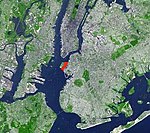Pioneer Works
2012 establishments in New York CityArt museums and galleries in New York CityArt museums established in 2012Artist residenciesContemporary art galleries in the United States ... and 2 more
Museums in BrooklynRed Hook, Brooklyn

Pioneer Works is a non-profit cultural center in Red Hook, New York City. The center builds community through the arts and sciences to create an open and inspired world. It encourages radical thinking across disciplines by providing practitioners a space to work, tools to create, and a platform to exchange ideas that are free and open to all. 85% of its funds are spent on free programming.
Excerpt from the Wikipedia article Pioneer Works (License: CC BY-SA 3.0, Authors, Images).Pioneer Works
Pioneer Street, New York Brooklyn
Geographical coordinates (GPS) Address Website External links Nearby Places Show on map
Geographical coordinates (GPS)
| Latitude | Longitude |
|---|---|
| N 40.679235 ° | E -74.0122 ° |
Address
Pioneer Works
Pioneer Street
11231 New York, Brooklyn
New York, United States
Open on Google Maps









